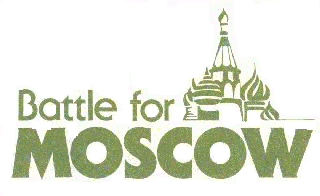Grognard.com: Wargames on the Web


Learning How to Play Wargames
It's easy to learn how to play Battle for Moscow.
Print the counters, map and charts and examine
them. With these at hand, print and read the rules.
The rules tell you how to play the game,
and they also tell you how to learn the game. Once you've read them, you're ready to play.
You may not play too well first time, but keep at it. Each time you play, you become more
familiar with the rules.
Now that you know how to play the game, the next step is to learn how to play it well. One of
the best ways to do this is to play the game several times, trying different approaches each
time until you find one that works best for you. While there's no one "best" way to win, there are
several principles (similar to those that military commanders follow) to keep in mind for better
play:
- Objective
-
Always keep the objective in mind. In Battle for Moscow, the player who controls
Moscow at the end of the game wins. Each player should develop his strategies with this
objective in mind: the German player on how to take Moscow, and the Soviet player on how to
defend Moscow or how to retake the city if he loses it. All other game strategies for both sides
are means to the end and must not supplant the objective.
- Campaign Plan
-
Formulate a general plan of what you hope to do over the course of a few
turns. If you don't have a plan, you're likely to play by just responding to the immediate
situation, and doing this can prove disastrous over the course of 2 or 3 turns. Follow your plan,
but be prepared to abandon it and form a new one if your opponent stops you cold.
- Concentraton of Forces
-
You can't be strong everywhere at once on the map, and trying for
this will simply leave you weak everywhere. If you have a plan, then you have an idea of where
to concentrate your
forces so that you will have enough strength to follow through on your plan. For example, if the
German player's plan is to make a double thrust on Moscow, one through Rzhev and one
through Orel-Tula, then his strong forces should be concentrated on these two lines. Massing
strong forces in front of Roslavl to defeat the Soviet armies there should be avoided because
this doesn't advance the plan.
- Maneuver and Battle
-
Maneuver your forces to take the best advantage of terrain and the
positioning of the enemy forces; seek to increase your possible options and limit your
opponent's. Engage in combat where the results (such as taking a position or causing losses to
the enemy) helps you; don't waste time and resources on actions that won't improve your
situation even if they succeed.
- Anticipation
-
Try to anticipate your opponent's moves and your future moves. If you can
foresee that your opponent is go ing to block your plan, then you can start forming a new plan
immediately rather than wasting time on a dead-end plan.
- Tactics
-
One good tactic is to seek to surround (with units and their zones of control) the
enemy units you plan to attack, as surrounded units which are forced to retreat are eliminated
instead. In combat, select the tactics that best suit your plan and situation: strong attacks
(odds of 4:1 or more) to gain ground
and inflict losses on the enemy, attritional attacks (2:1 and 3:1 odds) to wear down the enemy
strength (at the cost of taking losses yourself), and low-odds attacks (1:1) when the slim chance
of forcing a retreat outweighs the risk of your forces taking losses. When moving your forces,
use terrain and your units' zones of control to limit your opponent's response to your move .
- Your Ultimate Goal
-
Don't forget your ultimate goal while you're playing the game. Winning is
nice, but, statistically, half of all players lose. The real goal is to have fun, so make the best of
everything during the game, concentrate, and, above all, have fun.

Back to Battle for Moscow home page

Please report any problems with this page (bfm/learn.html).


